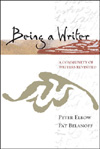Workshop 7
On Hearing Poetry
Have you ever read a poem that made absolutely no sense until someone read it out loud to you? If not, perhaps the activity below will help you experience this for the first time. If so, then you are probably already aware of the tremendous role that voice plays in poetry. Because poetry strives to use language in creative ways, we often have great difficulty hearing the voice of a poem. A particularly skillful reader can make a poem comprehensible, or even beautiful, simply by helping us hear the voice within the language of a poem. The reader's interpretation is not necessarily the correct interpretation, or even the best interpretation; indeed, there may be several other "readings" that make just as much sense. Yet by giving voice to the words within a poem, a gifted reader makes us aware of meaning that we didn't previously recognize. Likewise, the gifted poet understands how to make written words carry a unique voice, one which a gifted reader can animate. The World Wide Web provides a particularly practical medium for interpreting voice in poetry, since it can present the written words of a poem, along with a reader's performance of the poem. No wonder poetry has enjoyed such a renaissance with the advent of the World Wide Web! Here are just a few of the hundreds of web pages featuring poetry with accompanying audio and/or video files: - Cross Connect -- Highly recommended literary zine from the University of Pennsylvania that offers such tidbits as live audio poetry readings and interviews with top contemporary writers.
- Sounds From the Underground -- Music, poetry readings, sound collages, interviews, festivals and a willingness to accept demo tapes are what the Sounds from the Underground are all about. This psychedelic site covers a wide range of music and poetry styles.
- The Negro Speaks of Rivers: Academy of American Poets -- Langston Hughes fans can read the text of "The Negro Speaks of Rivers" as well as listen to the author recite the piece via an audio file. For those who have souls as deep as the river.
Many poets are particularly adept at furnishing their writing with a voice, and many poetry readers know how to listen to the voice of a poem without the aid of an oral performance. But the fact that so many poetry sites provide accompanying sound files for their poems suggests that hearing the voice from the written word isn't always easy. If you don't hear the voice of a poem -- or don't even get a poem at all -- you shouldn't feel embarrassed. More likely than not, you are in good company! The following exercise is designed to help you discover the voice of an online poem and consider the interpretative role that oral performance plays in the life of a poem. To begin with, find a poem on the web that has an accompanying audio or video performance. When you have found one, read it and practice the techniques of performing, inhabiting and describing that are discussed in Workshop 7 of your textbook. Once you have a satisfactory description of the poem's voice, play the audio (or video) file and write down how the reader interpreted the poem's voice differently. The following hints should help you carry this activity out: - You can select any poem that you find on the web, but we strongly recommend that you use a poem from The Academy of American Poets' Listening Booth. The poems by E. E. Cummings, Louise Gluck, Marilyn Nelson and Dylan Thomas are particularly good for this exercise.
- If you don't get the gist of a poem, you can still comment on the voice. In fact, once you begin to write down a few observations about voice, it may help you come to an understanding of the poem.
- When you play the audio file, begin by commenting on the tone of voice: does the reader sound angry? bored? excited? afraid? After you have decided on a general tone, begin to think about the smaller idiosyncrasies, such as pauses and changes in volume. Strive to draw some conclusions about what the reader was trying to convey, as well as about how his or her interpretation was different from your own.
- If after listening to the audio file you are still having trouble understanding what the poem is about, make sure you consider the title-- it often points you in the correct interpretative direction. Finally, if you just can't get anywhere with a poem, look for another one-- there are plenty to choose from!
- Try to draw some conclusions about how important the oral performance of this poem was for your own interpretation. Did your understanding of the poem change after you heard the sound file? On the basis of this answer, would you say that the voice of this poem is central to its overall theme or purpose?
|



 2003 McGraw-Hill Higher Education
2003 McGraw-Hill Higher Education